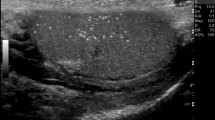Abstract
The purpose was to analyse the aetiology and ultrasound appearances of segmental testicular infarction. Patients with focal testicular lesions underwent colour Doppler high frequency ultrasound. Segmental testicular infarction was defined as any focal area of altered reflectivity, with or without focal enlargement with absent or diminished colour Doppler flow, proven on histology or on follow-up exclusion of lesion progression. Patients were reviewed to document lesion shape, position, border definition, reflectivity and vascularity and correlated to presenting clinical symptoms and signs. Over a 6-year period 24 patients were defined as having segmental testicular infarction; median age was 37 years (range 16–82 years). All presented with a sudden onset of testicular pain. Of the patients, 14/24 (58.3%) had scrotal inflammatory disease, 5/24 (20.8%) had evidence of spermatic cord torsion, and three patients were termed idiopathic; 12/24 (50.0%) were of low reflectivity, 11/24 (45.8%) of mixed reflectivity, one of high reflectivity, 11/24 (45.8%) were wedge shaped, and 13/24 (54.2%) were round shaped. Of the patients, 8/24 (33.3%) demonstrated a mass effect, all with round-shaped lesions and with underlying epididymo-orchitis in seven. Absent colour Doppler flow was demonstrated in 20/24 (83.3%). Histology confirmed infarction in 8/24 (33.3%), and 12/24 (50.0%) had follow-up examinations without progression of the lesions. Segmental testicular infarction has characteristic ultrasound features, not always wedge-shaped, with reduced or absent vascularity of key importance. Awareness of the ultrasound features will allow for conservative management and avoid unnecessary orchidectomy.







Similar content being viewed by others
References
Han DP, Dmochowski RR, Blasser MH, Auman JR (1994) Segmental infarction of the testicle: atypical presentation of a testicular mass. J Urol 151:159–160
Costa M, Calleja R, Ball RY, Burgess N (1999) Segmental testicular infarction. Br J Urol Int 83:525
Ruibal M, Quintana JL, Fernandez G, Zungri E (2003) Segmental testicular infarction. J Urol 170:187–188
Kodoma K, Yotsuyanagi S, Fuse H, Hirano S, Kitagawa K, Masuda S (2000) Magnetic resonance imaging to diagnose segmental testicular infarction. J Urol 163:910–911
Brehmer-Andersson E, Andersson L, Johansson J (1985) Hemorrhagic infarctions of testis due to intimal fibroplasia of spermatic artery. Urology 25:379–382
Baer HM, Gerber WL, Kendall AR, Locke JL, Putong PB (1989) Segmental infarct of the testis due to hypersensitivity angiitis. J Urol 142:125
Jordan GH (1987) Segmental hemorrhagic infarct of testicle. Urology 29:60–63
Gofrit ON, Rund D, Shapiro A, Pappo O, Landau EH, Pode D (1998) Segmental testicular infarction due to sickle cell disease. J Ultrasound Med 160:835–836
Bird K, Rosenfield AT (1984) Testicular infarction secondary to acute inflammatory disease: demonstration by B-scan ultrasound. Radiology 152:785–788
Sriprasad SI, Kooiman GG, Muir GH, Sidhu PS (2001) Acute segmental testicular infarction: differentiation from tumour using high frequency colour Doppler ultrasound. Br J Radiol 74:965–967
Tumeh SS, Benson CV, Richie JP (1991) Acute diseases of the scrotum. Semin Ultrasound CT MR 2:115–130
Sidhu PS (1999) Clinical and imaging features of testicular torsion: role of ultrasound. Clin Radiol 54:343–352
Gunther P, Schenk JP, Wunsch R, Holland-Cunz S, Kessler U, Troger J et al (2006) Acute testicular torsion in children: the role of sonography in the diagnostic workup. Eur Radiol 16:2527–2532
Fernandez-Perez GC, Tardaguila FM, Velasco M, Rivas C, Dos Santos J, Cambronero J et al (2005) Radiologic findings of segmental testicular infarction. Am J Roentgenol 184:1587–1593
Penson DF, Aronson WJ (1995) Segmental testicular infarction in the neonate: a case report. J Urol 153:1992–1993
Shapiro SR, Rabinovitz J, Konrad P, Tesluk H (1977) Infarction of the testicle in a child simulating testicular tumour. J Urol 118:485–486
Dewbury KC (2000) Scrotal ultrasonography: an update. BJU Int 86:143–152
Kramolowsky EV, Beauchamp RA, Milby WP (1993) Color Doppler ultrasound for the diagnosis of segmental testicular infarction. J Urol 150:972–973
Sidhu PS, Sriprasad S, Bushby LH, Sellars ME, Muir GH (2004) Impalpable testis cancer. BJU Int 93:888
Ledwidge ME, Lee DK, Winter TC, III, Uehling DT, Mitchell CC, Lee FT, Jr (2002) Sonographic diagnosis of superior hemispheric testicular infarction. Am J Roentgenol 179:775–776
Flanagan JJ, Fowler RC (1995) Testicular infarction mimicking tumour on scrotal ultrasound: a potential pitfall. Clin Radiol 50:49–50
Horstman WG, Melson GL, Middleton WD, Andriole GL (1992) Testicular tumours: Findings with color Doppler US. Radiology 185:733–737
Bushby LH, Sriprasad S, Hopster D, Muir G, Clarke JL, Sidhu PS (2001) High frequency colour Doppler US of focal testicular lesions: crossing vessels (criss-cross pattern) identifies primary malignant tumours (Abstract). Radiology (Suppl) 221:449
Eisner DJ, Goldman SM, Petronis J, Millmond SH (1991) Bilateral testicular infarction caused by epididymitis. Am J Roentgenol 157:517–519
Vordermark JS, Favila M (1982) Testicular necrosis: a preventable complication of epididymitis. J Urol 128:1322–1324
Dogra V, Ledwidge ME, Winter TC III, Lee FT Jr (2003) Bell-clapper deformity. Am J Roentgenol 180:1176–1177
Johnson JO, Mattrey RF, Phillipson J (1990) Differentiation of seminomatous from nonseminomatous testicular tumors with MR imaging. Am J Roentgenol 154:539–543
Paltiel HJ, Kalish LA, Susaeta RA, Frauscher F, O’Kane PL, Freitas-Filho LG (2006) Pulse-inversion us imaging of testicular ischemia: quantitative and qualitative analyses in a rabbit model. Radiology 239:718–729
Thierman JS, Clement GT, Kalish LA, O’Kane PL, Frauscher F, Paltiel HJ (2006) Automated sonographic evaluation of testicular perfusion. Phys Med Biol 51:3419–3432
Author information
Authors and Affiliations
Corresponding author
Rights and permissions
About this article
Cite this article
Bilagi, P., Sriprasad, S., Clarke, J.L. et al. Clinical and ultrasound features of segmental testicular infarction: Six-year experience from a single centre. Eur Radiol 17, 2810–2818 (2007). https://doi.org/10.1007/s00330-007-0674-2
Received:
Revised:
Accepted:
Published:
Issue Date:
DOI: https://doi.org/10.1007/s00330-007-0674-2




